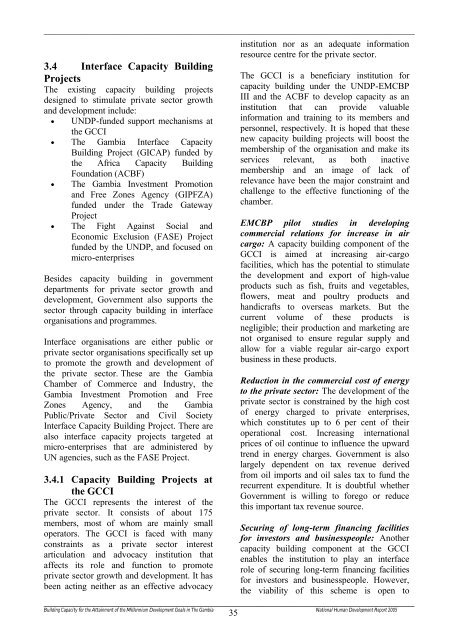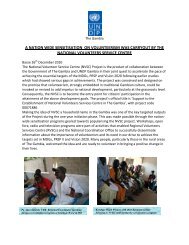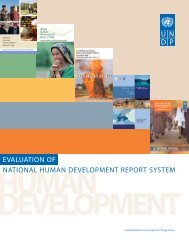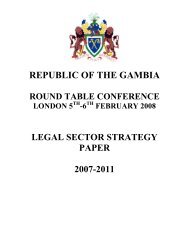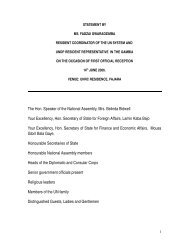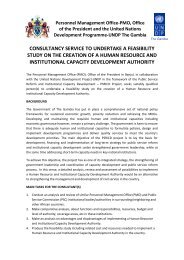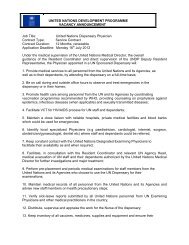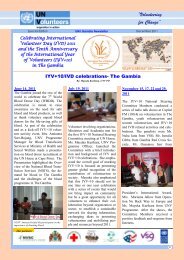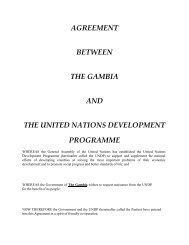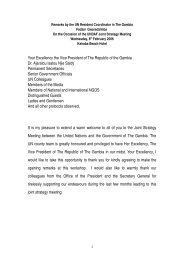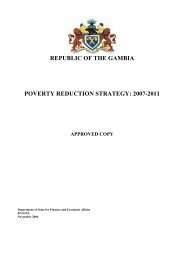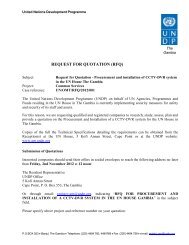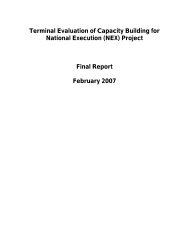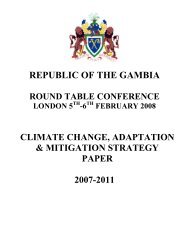Introduction - UNDP The Gambia
Introduction - UNDP The Gambia
Introduction - UNDP The Gambia
You also want an ePaper? Increase the reach of your titles
YUMPU automatically turns print PDFs into web optimized ePapers that Google loves.
________________________________________________________________________________________________________________________<br />
3.4 Interface Capacity Building<br />
Projects<br />
<strong>The</strong> existing capacity building projects<br />
designed to stimulate private sector growth<br />
and development include:<br />
• <strong>UNDP</strong>-funded support mechanisms at<br />
the GCCI<br />
• <strong>The</strong> <strong>Gambia</strong> Interface Capacity<br />
Building Project (GICAP) funded by<br />
the Africa Capacity Building<br />
Foundation (ACBF)<br />
• <strong>The</strong> <strong>Gambia</strong> Investment Promotion<br />
and Free Zones Agency (GIPFZA)<br />
funded under the Trade Gateway<br />
Project<br />
• <strong>The</strong> Fight Against Social and<br />
Economic Exclusion (FASE) Project<br />
funded by the <strong>UNDP</strong>, and focused on<br />
micro-enterprises<br />
Besides capacity building in government<br />
departments for private sector growth and<br />
development, Government also supports the<br />
sector through capacity building in interface<br />
organisations and programmes.<br />
Interface organisations are either public or<br />
private sector organisations specifically set up<br />
to promote the growth and development of<br />
the private sector. <strong>The</strong>se are the <strong>Gambia</strong><br />
Chamber of Commerce and Industry, the<br />
<strong>Gambia</strong> Investment Promotion and Free<br />
Zones Agency, and the <strong>Gambia</strong><br />
Public/Private Sector and Civil Society<br />
Interface Capacity Building Project. <strong>The</strong>re are<br />
also interface capacity projects targeted at<br />
micro-enterprises that are administered by<br />
UN agencies, such as the FASE Project.<br />
3.4.1 Capacity Building Projects at<br />
the GCCI<br />
<strong>The</strong> GCCI represents the interest of the<br />
private sector. It consists of about 175<br />
members, most of whom are mainly small<br />
operators. <strong>The</strong> GCCI is faced with many<br />
constraints as a private sector interest<br />
articulation and advocacy institution that<br />
affects its role and function to promote<br />
private sector growth and development. It has<br />
been acting neither as an effective advocacy<br />
institution nor as an adequate information<br />
resource centre for the private sector.<br />
<strong>The</strong> GCCI is a beneficiary institution for<br />
capacity building under the <strong>UNDP</strong>-EMCBP<br />
III and the ACBF to develop capacity as an<br />
institution that can provide valuable<br />
information and training to its members and<br />
personnel, respectively. It is hoped that these<br />
new capacity building projects will boost the<br />
membership of the organisation and make its<br />
services relevant, as both inactive<br />
membership and an image of lack of<br />
relevance have been the major constraint and<br />
challenge to the effective functioning of the<br />
chamber.<br />
EMCBP pilot studies in developing<br />
commercial relations for increase in air<br />
cargo: A capacity building component of the<br />
GCCI is aimed at increasing air-cargo<br />
facilities, which has the potential to stimulate<br />
the development and export of high-value<br />
products such as fish, fruits and vegetables,<br />
flowers, meat and poultry products and<br />
handicrafts to overseas markets. But the<br />
current volume of these products is<br />
negligible; their production and marketing are<br />
not organised to ensure regular supply and<br />
allow for a viable regular air-cargo export<br />
business in these products.<br />
Reduction in the commercial cost of energy<br />
to the private sector: <strong>The</strong> development of the<br />
private sector is constrained by the high cost<br />
of energy charged to private enterprises,<br />
which constitutes up to 6 per cent of their<br />
operational cost. Increasing international<br />
prices of oil continue to influence the upward<br />
trend in energy charges. Government is also<br />
largely dependent on tax revenue derived<br />
from oil imports and oil sales tax to fund the<br />
recurrent expenditure. It is doubtful whether<br />
Government is willing to forego or reduce<br />
this important tax revenue source.<br />
Securing of long-term financing facilities<br />
for investors and businesspeople: Another<br />
capacity building component at the GCCI<br />
enables the institution to play an interface<br />
role of securing long-term financing facilities<br />
for investors and businesspeople. However,<br />
the viability of this scheme is open to<br />
________________________________________________________________________________________________<br />
Building Capacity for the Attainment of the Millennium Development Goals in <strong>The</strong> <strong>Gambia</strong> National Human Development Report 2005<br />
35


